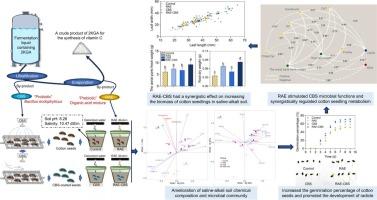当前位置:
X-MOL 学术
›
Ind. Crops Prod.
›
论文详情
Our official English website, www.x-mol.net, welcomes your
feedback! (Note: you will need to create a separate account there.)
A strategy for improving saline-alkali soil properties and cotton stress tolerance using vitamin C industrial wastes: A “prebiotics-probiotics” interaction between organic acids and Bacillus endophyticus
Industrial Crops and Products ( IF 5.6 ) Pub Date : 2024-07-16 , DOI: 10.1016/j.indcrop.2024.119187 Mingfu Gao , Xiao Han , Weichao Yang , Hao Sun , Lixin Zhang , Hui Xu
Industrial Crops and Products ( IF 5.6 ) Pub Date : 2024-07-16 , DOI: 10.1016/j.indcrop.2024.119187 Mingfu Gao , Xiao Han , Weichao Yang , Hao Sun , Lixin Zhang , Hui Xu

|
Two bulk wastes generated from the vitamin C industry, fermentation residue after evaporation (RAE) and concentrated bacterial ( strain CBS-1) solution (CBS), are currently disposed of as wastewater without a cost-effective recycling strategy. In this study, CBS was used as a microbial coating agent for cotton seeds ( L.) and combined with the RAE application to assess their potential effects on saline-alkali soil and cotton’s germination and growth. The results demonstrated that CBS could elevate soil nutrients and promote cotton growth. Notably, when RAE was supplied to CBS-coated cotton seeds, RAE-CBS synergistically enhanced seed germination and increased aboveground fresh-weight and root dry-weight by 133.96 % and 51.56 %, respectively. The amelioration of soil chemistry properties (such as pH, organic carbon, ammonium-nitrogen and available phosphorus) driven by RAE-CBS provided a greater contribution to biomass accumulation and remodeling of rhizosphere bacterial community structure (including increased the abundance of , and ) compared to RAE or CBS application alone. Additionally, RAE-CBS had a synergistic effect on increasing the levels of expression, carotenoids, osmoregulatory substances (soluble carbohydrates, soluble proteins and proline) and catalase activity, which were related to saline-alkali stress tolerance of cotton. Furthermore, RAE-CBS induced an up-regulation of , which was essential for enhancing cotton’s stress response. Together, we propose a novel perspective that RAE, acts as a prebiotic composed of low-molecular-weight organic acids, stimulates the microbial functions of strain CBS-1, thus establishing a “prebiotic-probiotic” strategy for meliorating soil environment and crop growth. Simultaneously, this recycling approach will mitigate the environmental burdens caused by organic wastes discharged from the vitamin C industry.
中文翻译:

利用维生素C工业废料改善盐碱地性质和棉花抗逆性的策略:有机酸与内生芽孢杆菌之间的“益生元-益生菌”相互作用
维生素 C 行业产生的两种大宗废物,即蒸发后的发酵残渣 (RAE) 和浓缩细菌(菌株 CBS-1)溶液 (CBS),目前都作为废水进行处理,而没有采取具有成本效益的回收策略。本研究采用CBS作为棉籽(L.)的微生物包衣剂,并结合RAE应用,评估其对盐碱土壤和棉花萌发和生长的潜在影响。结果表明,CBS可以提高土壤养分,促进棉花生长。值得注意的是,当向 CBS 包衣的棉籽提供 RAE 时,RAE-CBS 协同增强种子发芽,并使地上鲜重和根干重分别增加 133.96% 和 51.56%。与 RAE-CBS 驱动的土壤化学性质(如 pH、有机碳、铵氮和速效磷)的改善相比,RAE-CBS 对生物量积累和根际细菌群落结构重塑(包括 、 和 的丰度增加)做出了更大的贡献单独用于 RAE 或 CBS 应用程序。此外,RAE-CBS对提高棉花耐盐碱胁迫相关的表达水平、类胡萝卜素、渗透调节物质(可溶性碳水化合物、可溶性蛋白质和脯氨酸)和过氧化氢酶活性水平具有协同作用。此外,RAE-CBS 诱导 的上调,这对于增强棉花的应激反应至关重要。我们共同提出了一个新的观点:RAE作为由低分子量有机酸组成的益生元,刺激菌株CBS-1的微生物功能,从而建立了改善土壤环境和作物生长的“益生元-益生菌”策略。 同时,这种回收方法将减轻维生素C行业排放的有机废物造成的环境负担。
更新日期:2024-07-16
中文翻译:

利用维生素C工业废料改善盐碱地性质和棉花抗逆性的策略:有机酸与内生芽孢杆菌之间的“益生元-益生菌”相互作用
维生素 C 行业产生的两种大宗废物,即蒸发后的发酵残渣 (RAE) 和浓缩细菌(菌株 CBS-1)溶液 (CBS),目前都作为废水进行处理,而没有采取具有成本效益的回收策略。本研究采用CBS作为棉籽(L.)的微生物包衣剂,并结合RAE应用,评估其对盐碱土壤和棉花萌发和生长的潜在影响。结果表明,CBS可以提高土壤养分,促进棉花生长。值得注意的是,当向 CBS 包衣的棉籽提供 RAE 时,RAE-CBS 协同增强种子发芽,并使地上鲜重和根干重分别增加 133.96% 和 51.56%。与 RAE-CBS 驱动的土壤化学性质(如 pH、有机碳、铵氮和速效磷)的改善相比,RAE-CBS 对生物量积累和根际细菌群落结构重塑(包括 、 和 的丰度增加)做出了更大的贡献单独用于 RAE 或 CBS 应用程序。此外,RAE-CBS对提高棉花耐盐碱胁迫相关的表达水平、类胡萝卜素、渗透调节物质(可溶性碳水化合物、可溶性蛋白质和脯氨酸)和过氧化氢酶活性水平具有协同作用。此外,RAE-CBS 诱导 的上调,这对于增强棉花的应激反应至关重要。我们共同提出了一个新的观点:RAE作为由低分子量有机酸组成的益生元,刺激菌株CBS-1的微生物功能,从而建立了改善土壤环境和作物生长的“益生元-益生菌”策略。 同时,这种回收方法将减轻维生素C行业排放的有机废物造成的环境负担。











































 京公网安备 11010802027423号
京公网安备 11010802027423号